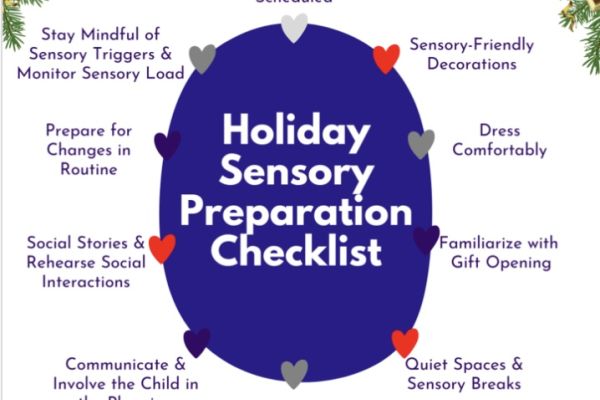
Holiday Season Sensory Preparation Checklist
| Featured Article
The holiday season may present various sensory challenges for our neurodivergent children. As their advocates, our goal is to ensure they have an enjoyable holiday experience and feel supported in meeting their needs. To aid in achieving this, we’ve crafted a helpful checklist.
1. Create a Visual Holiday Schedule
In school, our children do well with visual schedules, understanding where they’re going and what tasks to tackle. Imagine extending that helpful tool beyond the school setting! This approach helps ease the stress and anxiety often associated with navigating various locations and social interactions:
- Develop a visual schedule of holiday events and activities to provide predictability for the child.
- Include pictures or symbols to represent each activity and discuss the schedule in advance.
2. Sensory-Friendly Holiday Decorations
Understanding sensory needs is so important. Children with sensory needs can be triggered by various stimuli such as sound, light, touch, taste, or smell. As parents, we are aware of this, and we want to ensure that others who come in contact with our children can accommodate them as well! Now, let’s talk about sensory-friendly holiday decorations:
- Use sensory-friendly decorations like soft lights, non-flashing ornaments, and gentle music.
- Avoid overwhelming decorations that may cause sensory discomfort.
3. Dress Comfortably
The importance of dressing comfortably as a sensory is often overlooked. It’s not just a matter of disliking tags in shirts; it extends to preferences like how wool feels against the skin or favoring sweatpants over jeans (that’s me). Let’s discuss some strategies for dressing your child comfortably:
- Select comfortable clothing for the child, taking into account sensory preferences regarding fabrics, and avoid items with tags or scratchy materials.
- Have a spare set of comfortable clothes on hand for unexpected changes.
4. Familiarize Holiday Gift Opening
Have you ever observed the mix of excitement and worry when opening gifts and receiving new things? Questions like, “Will I like it?” or “Is it something I asked for?” may arise, along with concerns about successfully opening the gift. Now, consider children experiencing similar feelings. How can we minimize that anxiety for them?
- Practice gift opening to reduce anxiety. Use wrapping paper with various textures and allow the child to explore it beforehand.
- Gradually introduce the concept of surprises and gifts.
5. Quiet Spaces & Sensory Breaks
Where can your child find a quiet place to decompress? Identifying a space where your child can escape from the noise, bright lights, and social interactions is crucial for them to regulate their central nervous system. These quiet spaces also provide opportunities for the child to take sensory breaks. How can you create such spaces?
- Ask the host if they have a quiet space where your child can decompress.
- Identify quiet spaces at holiday gatherings where the child can retreat if sensory input becomes overwhelming.
- Bring sensory-friendly items like headphones, fidget toys, or a cozy blanket for comfort.
- Schedule regular sensory breaks throughout the day to help the child self-regulate.
- Incorporate activities that provide sensory input, such as swinging, deep pressure, or tactile experiences.
6. Plan Holiday Food Options
There is a common saying that neurodivergents are picky eaters, but I prefer to say that everybody has their preferences and that is okay—some people like pumpkin pie, and some like sweet potato pie. I don’t eat dressing, but my mother loves it. So, how are you making sure your children can eat and prepare for their meals?
- Consider the child’s sensory preferences when planning holiday meals.
- Have familiar and preferred foods available to ensure the child has options they are comfortable with.
- Remind others, should they say something, that everyone has their preferences and it is okay.
7. Communicate & Involve the Child in Holiday Planning
Communication holds great significance for children, especially for our neurodivergent ones with sensory needs. While conveying what might occur and when is crucial, actively involving them in the planning process is equally important, as it’s meant to be their holiday time as well.
- Clearly communicate expectations for each holiday event, explaining potential sensory experiences.
- Prepare the child for changes in routine and discuss coping strategies.
- Involve the child in planning activities and decorating to give them a sense of control.
- Allow them to choose some holiday elements to make the season more enjoyable.
8. Social Stories & Rehearse Social Interactions
It is important to prepare our children for the different social situations that they may encounter. Thankfully, this can be done by using social stories and practicing situations that can be difficult so that they are less anxious about how to navigate those situations.
- Create social stories that explain holiday traditions and potential sensory experiences.
- Use the stories to discuss how to respond and engage with others in a way that doesn’t make the child uncomfortable but communicates their needs and boundaries.
- Help them develop positive coping strategies for the different situations they will encounter.
- Role-play the different scenarios so that they are less anxious about what could occur.
9. Prepare for Changes in Routine
A significant disruption in routine occurs when the child is no longer in school, and perhaps parents are off work or the service member is on leave. Anticipate these changes in routine and offer support to facilitate a smoother transition. Here’s how you can achieve that!
- Gradually introduce changes in routine leading up to the holiday season.
- Use visual cues and reminders to signal upcoming transitions.
10. Stay Mindful of Sensory Triggers & Monitor Sensory Load
Keep in mind that you already know their triggers and cues, and depending on their age, they may be aware of them too. Don’t allow the situations you encounter to overwhelm both you and them, causing you to forget about these important aspects. Remember the points mentioned below.
- Identify potential sensory triggers at holiday events and plan accordingly.
- Communicate with others about the child’s sensory needs and sensitivities.
- Pay attention to the child’s cues and adjust activities accordingly.
- Be flexible and willing to modify plans based on the child’s comfort level.
Conclusion
Lastly, remember every child is unique, so tailor this checklist to the specific needs and preferences of the child. Communicate with them regularly, encourage them to express their feelings, emotions, and reservations regarding the holiday events, and show them how the holidays can be an enjoyable experience for everyone.
About the Authors
Tricia Ross, Marketing Director

Tricia Ross, a devoted military wife of 22 years, has dedicated over two decades to advocating for military families. Passionate about connecting them to resources that ease the challenges of frequent relocations, Tricia serves as the Director of Communications for The Rosie Network and volunteers as the Marketing Director for Partners in PROMISE, an organization focused on safeguarding the rights of military children in special education. With a background in national nonprofits, a Bachelor’s degree in Behavioral Science, and a Master’s in Human Services, she brings valuable experience to her roles. In addition to her advocacy work, Tricia is an educator, teaching English as a Second Language Business & Entrepreneur Classes at Coastal Carolina Community College. Residing in Jacksonville, North Carolina, with her husband and four children, Tricia’s leadership and dedication make her a powerful force for positive change in the lives of military members and their families.
Destiny Huff, Social Media Manager

Destiny Huff is the Social Media Manager for Partners in PROMISE. She is a proud Army spouse, former military brat of a Retired CS, and mother of two amazing neurodivergent boys. As a Licensed Professional Counselor, Special Education Advocate, and IEP Coach, Destiny works with military service members and their families in mental health and special education. Destiny holds a Bachelor’s Degree and Master’s Degree in Psychology and is currently a Doctoral Candidate in her General Psychology Program. The research focus is on the use of bibliotherapy as a clinical strategy to address the unique challenges that military children face. Destiny currently runs both her Private Practice and Advocacy business, while continuing to advocate for her children’s needs and educating others on Neurodivergence.





Leave a Reply